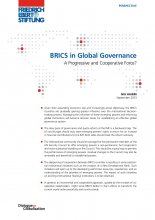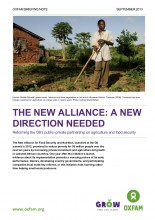In this column, Share the World's Resources' Rajesh Makwana calls for an end to the corporate capture of sustainable development policies, especially at the international level. Makwana cautions against the growing influence of corporate interests in UN processes and the pro-market solutions they advocate for, in particular the concept of a "green economy" that does not question the growth paradigm and proposes to monetize nature. His column comes at a time when GPF has just co-published a working paper on [...]
Latest on Corporate Influence and Accountability (External) - Archive
A new report by Public Services International assesses the experience with public-private partnerships (PPP) in both industrialized and developing countries. The many case studies analyzed, from United Kingdom to Chile, shows that PPPs have failed to live up to their promise. In most cases, they are an expensive and inefficient way of financing infrastructure and services, since they conceal public borrowing, while providing long-term state guarantees for profits to private companies. The author proposes a public alternative to this system [...]
Understand power structures to overturn them
In its third annual ‘State of Power’ report, Transnational Institute (TNI) uses vibrant infographics and intriguing essays to expose and analyse the principal power-brokers that have caused financial, economic, social and ecological crises worldwide. This collection of essays and accompanying infographics draws attention to key dimensions of power and its exercise in our globalised world. The contributions highlight how power is hidden and concealed.
Close relatives of China’s top leaders have held secretive offshore companies in tax havens that helped shroud the Communist Party elite’s wealth, a leaked cache of documents reveals. The confidential files include details of a real estate company co-owned by current President Xi Jinping’s brother-in-law and British Virgin Islands companies set up by former Premier Wen Jiabao’s son and also by his son-in-law.
European Parliament and Council achieved a significant breakthrough on the issue of high-speed trading. Yesterday, the EU reached an agreement over plans to reform the markets in the Financial Instruments Directive (Mifid), a law that sets the for securities markets in Europe. The application of Mifid will curb speculation, through the use of derivatives, in food, energy and other commodity markets.
TTIP and TPP void
FIAN International launches a letter action addressing the EU, the USA and a number of countries negotiating directly or indirectly the Transatlantic Trade and Investment Partnership (TTIP) and Trans-Pacific Partnership (TPP). The letter action is open and invites for participation. It raises grave concerns about the TTIP and TPP initiatives both for procedure and content.
A joint statement was drafted by participants of the first annual People's Forum on Human Rights and Businesses calling for an international legally binding instrument on human rights, transnational corporations and other business enterprises. The Forum demands the establishement of monitoring mechanisms that include the supervision of extraterritorial obilgations of transnational corporations.
Business Capture of COP 19 in Warsaw
A new report published by Corporate Europe Observatory (CEO) and Transnational Institute (TNI) highlights the web of corporate lobbying and industry capture of COP19, the yearly UN climate negotiations, taking place in Warsaw, 11-22 November 2013. The guide exposes the eleven official corporate partners of the conference, takes a look at some of the other influential Polish lobbies, and examines an extensive list of the lobby groups attending the COP. It also covers the false solutions that are being offered [...]
The Human Rights & Grivance Mechanisms programme (HRGM), a SOMO initiative, launches a website which provides information and advice on various non-judicial grievance mechanisms for filing complaints against companies and multinationals. More recently HRGM has included a brochure and introduction video in particular regarding the grievance mechanism of the African Development Bank (AfDB).
The EU’s agenda to ‘blend’ public development finance with private finance
‘Blending’ is a mechanism that links a grant element, provided by official development assistance (ODA), with loans from publicly owned institutions or commercial lenders. This is not a new phenomenon. What is new is the narrative of the European Union (EU), which argues that using ODA to leverage private finance is the solution following the financial crisis. There has been an increase in development finance institutions (DFIs) and EU donors using blending mechanisms to increase support and lending to private [...]
Putting the Cartel before the Horse...and Farm, Seeds, Soil and Peasants etc: Who Will Control the Agricultural Inputs?
ETC Group and EcoNexus have issued reports surrounding the corporate control that is entrenched in the global food chain. The reports delve in to the dominance of the agricultural sector particularly in the industrial farm inputs such as animal feed production, livestock breeding, fertilizers/pesticides and seed production amongst others. Their findings show the devastation that these monopolies are causing to local farmers as their local breeds and food crop varieties have been lost.
Fracking and the global land grab
Linking the current boom of unconventional gas extraction within the broader pattern of land and water grabbing, a new briefing paper by Transnational Institute (TNI) explores where fracking is happening today, who is promoting it, how, and the state of resistance against this potentially harmful practice.
Civil Society movements accused governments for protecting the interests of the biofuels industry rather than the interests of people pushed into hunger by biofuel policies at the Committee on World Food Security.
Both an oral and a written statement have been submitted by FIAN International on behalf of 14 organizations advocating for the economic, social, and cultural rights of women in rural communities, to the Committee on the Elimination of Discrimination against Women on its General Discussion on Rural Women, 56th Session, on October 7, 2013.
People have the right to land and seeds to produce healthy food, and practice food sovereignty!
On the occasion of the Global Day of Action for Food Sovereignty, La Via Campesina, a global movement of millions of peasants, small and medium-size farmers, landless people, women farmers, indigenous people, migrants and agricultural workers from around the world, calls for international support. Stating that the global food crisis can only be ended by food sovereignty and agro-ecological production, La Via Campesina urges "we should show the strength and diversity of our movements, coordinating actions against transnational agribusinesses like [...]
The social & environmental consequences of the proposed EU-US trade deal
As talks for the proposed EU-US Transatlantic Trade and Investment Partnership (TTIP/TAFTA) continue, the European Commission has released a document describing the economic benefits of a trading partnership between the EU and the US. Other reports however suggest that the expected economic benefits from such a partnership have masked the fact that the real impetus behind a deal comes from major EU and US corporations that have joined forces to remove as many labour, health and environmental standards as possible [...]
Alternatives and Resistance to Policies that Generate Hunger
Watch_2013_eng_WEB_final-1The Right to Food and Nutrition Watch has issued its annual publication for 2013. The title of the report is ‘Alternatives and Resistance to Policies that Generate Hunger’ and surrounds the policies that are in place that carry forth the social issues of hunger and malnutrition rather than reducing and putting a halt to them. It also reveals case studies on policies that foster violence and discrimination against women, policies that systematically limit and exclude large groups, such as peasants [...]
UN to approve “partnerships” before discussing the new development agenda
While the debate around increasing corporate influence at the United Nations is growing, Secretary-General Ban Ki-moon sticks with his plan to establish a new United Nations Partnership Facility within the UN Secretariat. The new facility is intended to "scale up UN capacity to engage in transformative multi-stakeholder partnerships with the private sector, civil society, philanthropists and academia across a broader range of issue areas". But as financing for the new institution will come from donors rather than from regular UN [...]
A Progressive and Cooperative Force?
The Friedrich-Ebert-Stiftung has issued a new report on the rising influence of the BRICS countries. As their economies are rapidly growing the BRICS' global responsibilities are gaining. This paper analyses the responsibilities that the BRICS need to maintain and promote in particular with regard to their membership in the UN’s Security Council to progress the nations' peacekeeping and efforts towards a new world order.
After several Latin American governments have been facing lawsuits brought to them by transnational corporations due to bilateral investment treaties that had been signed back in the 1990s, a ministerial meeting of 12 countries held in Guayaquil, Ecuador has come up with a joint action plan to oppose the million to billion dollar claims being made.
The new Alliance: A new Direction is needed
The New Alliance for Food Security and Nutrition, launched at the G8 summit in 2012, promises to reduce poverty for 50 million people over the next ten years by increasing private investment and agriculture-led growth in selected African countries. One year after the initiative’s launch, evidence provided by a new Oxfam Briefing note about its implementation presents a worrying picture of its performance so far
On 7 October, the second round of negotiations for a far-reaching transatlantic trade deal will begin in Brussels. Amidst calls for greater openness and public participation, the European Commission has gone into propaganda mode, promoting myths about the transparency and accountability of the talks. See through its feel-good rhetoric with Corporate Europe Observatory’s myth-busting guide to secrecy, corporate influence and lack of accountability in the transatlantic trade negotiations.
War on Want has issued a press release about a conduct code for private military and security companies issued in Geneva. It warns that the privatization of war continues as a measure of profit seeking as the code issued is voluntary and allows non-participation.
The Changing Role of Corporate Social Investment in the Extractive Resources Sector
Historically, corporate social investment has been represented as essentially a voluntary activity, linked to the broader corporate social responsibility (CSR) agenda. CSRM analysis of emerging trends in the global oil and gas and mining sectors suggests that this traditional view of corporate social investment is changing. In recent years leading resource companies have begun to use these investments more strategically to mitigate social risk, protect their corporate social licence to operate, and address growing societal expectations.
On September 11 European Parliament voted on proposals that aimed to limit the use of food crops for agrofuels (often referred to as ‘first generation biofuels’) that are pushing up global food prices, and to include measures against Indirect Land Use Change (ILUC) – like deforestation and land-grabbing. Yet fierce lobbying by the agrofuels industry is undermining any action taken, as the European Parliament's disappointing recent vote on the topic demonstrates.










